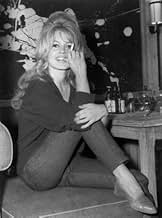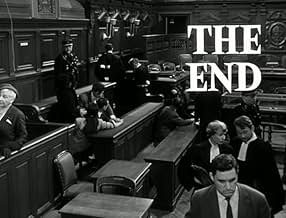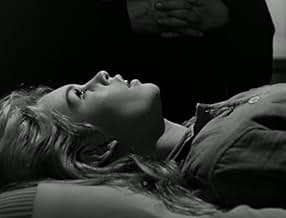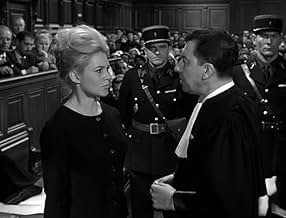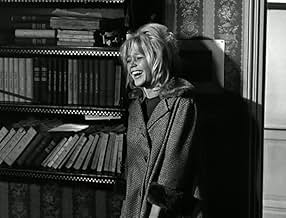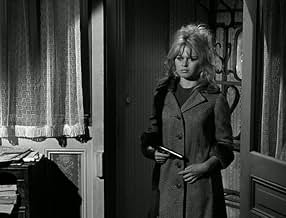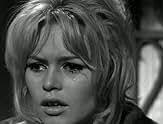IMDb रेटिंग
7.6/10
4.9 हज़ार
आपकी रेटिंग
अपनी भाषा में प्लॉट जोड़ेंA liberated small-town girl stands on trial to determine whether she killed her lover in a crime of passion or in premeditation.A liberated small-town girl stands on trial to determine whether she killed her lover in a crime of passion or in premeditation.A liberated small-town girl stands on trial to determine whether she killed her lover in a crime of passion or in premeditation.
- 1 ऑस्कर के लिए नामांकित
- 3 जीत और कुल 2 नामांकन
Barbara Sommers
- Daisy
- (as Barbara Sohmers)
फ़ीचर्ड समीक्षाएं
If "Rashomon" blew your mind, "La vérité" will blow your heart. In 1950, Japanese director Akira Kurosawa blew our minds with his unforgettable "Rashomon", a murder mystery that exposed the chimerical nature of truth as it is perverted by the flawed perception of each observer. We visualized the events surrounding a murder, via the conflicting testimonies of witnesses in court, never being told what's truth and what is not. Here in 1960 French director Henri-Georges Clouzot hits us with "La vérité", a murder mystery similarly visualized via testimonies in a courtroom drama, but in this case the facts are not disputed. In this case what's being subjectively perverted is the emotion behind the crime.
Brigitte Bardot is a young girl on trial for the murder of her lover. The prosecution perceives her as a cold-hearted, calculating killer. The defense sees her as a heartbroken, confused young girl pushed to a desperate act. What we get is a suspenseful peeling of the truth, but not the truth in terms of facts. We get to the root of the truth in terms of feelings. I imagine if you were to hook electrodes to your brain and study which areas light up when watching these films, "Rashomon" would light up your frontal lobe (logic center) while "La vérité" would light up that tiny peanut at the core of your head, the amygdala (emotional center).
The point being made, and unforgettably expressed in a passionate monologue by Ms. Bardot, is that hard facts aren't the only component of truth. She roars: "You sit up there, in your ridiculous robes, and you want to judge but you have never lived! Never loved! You hate me because you are dead! Dead!"
I challenge anyone to watch that scene and tell me that Brigitte Bardot isn't one of the finest actors. Even at the young age of 25, thrust into an intimidating arena alongside theatrically trained, veterand actors and one of the most notoriously perfectionist directors of cinema, she really carries the show. The role had originally been written for respected actor Sophia Loren, but Clouzot rewrote the entire story for Bardot after she was cast. Indeed she seemed to be made for this role and vice versa; the role was written for her (literally). In interviews Bardot stated that with no formal acting training she had to rely on convincing herself that she actually was the character Dominique. And this itself leads to a bizarre case of life imitating art (or the other way around?) where, feeling judged and persecuted by the press, Brigitte had a severe breakdown and shocking incident on her birthday in 1960 just weeks before the film's release. Google it after you watch the movie. Funny how even the press's & haters' reaction to the incident mirrored the prosecution's reaction to similar incidents in the tale of Dominique.
This film is a landmark with regard to emotional storytelling. And it's a landmark with regard to our human experience, attempting to understand this misshapen thing called reality. If you learned something from "Rashomon" then don't consider your education complete until you watch this essential companion film.
Brigitte Bardot is a young girl on trial for the murder of her lover. The prosecution perceives her as a cold-hearted, calculating killer. The defense sees her as a heartbroken, confused young girl pushed to a desperate act. What we get is a suspenseful peeling of the truth, but not the truth in terms of facts. We get to the root of the truth in terms of feelings. I imagine if you were to hook electrodes to your brain and study which areas light up when watching these films, "Rashomon" would light up your frontal lobe (logic center) while "La vérité" would light up that tiny peanut at the core of your head, the amygdala (emotional center).
The point being made, and unforgettably expressed in a passionate monologue by Ms. Bardot, is that hard facts aren't the only component of truth. She roars: "You sit up there, in your ridiculous robes, and you want to judge but you have never lived! Never loved! You hate me because you are dead! Dead!"
I challenge anyone to watch that scene and tell me that Brigitte Bardot isn't one of the finest actors. Even at the young age of 25, thrust into an intimidating arena alongside theatrically trained, veterand actors and one of the most notoriously perfectionist directors of cinema, she really carries the show. The role had originally been written for respected actor Sophia Loren, but Clouzot rewrote the entire story for Bardot after she was cast. Indeed she seemed to be made for this role and vice versa; the role was written for her (literally). In interviews Bardot stated that with no formal acting training she had to rely on convincing herself that she actually was the character Dominique. And this itself leads to a bizarre case of life imitating art (or the other way around?) where, feeling judged and persecuted by the press, Brigitte had a severe breakdown and shocking incident on her birthday in 1960 just weeks before the film's release. Google it after you watch the movie. Funny how even the press's & haters' reaction to the incident mirrored the prosecution's reaction to similar incidents in the tale of Dominique.
This film is a landmark with regard to emotional storytelling. And it's a landmark with regard to our human experience, attempting to understand this misshapen thing called reality. If you learned something from "Rashomon" then don't consider your education complete until you watch this essential companion film.
By far the best Brigitte Bardot picture, engaged with the avant-garde director Henry-Georges Clouzot, fitting perfect with a drawn up screenplay, about a lazy girl Dominique (Bardot) tired of his hometown lifestyle, decides by any mean living together with her old sister Annie (Marie-Jose Nat) at glamorous Paris in the early sixties, meanwhile his sister makes a hard efforts to learning classic music, otherwise Dominique dropped her preparatory course to work at beauty parlor, spending her time at bars and night clubs with questionable friendship, until meets Gilbert Tellier (Sami Frey) a promising musician which his sister raising hopes for future marriage, Tellier gonna crazy by so beautiful and sexy Dominique, although she scorns him, when he finally got her, he treats her possessively and grossly, they break apart, she suffers and end up sell yourself on prostitution, at their last meeting she on its kenees begs your pardon, then they had a love night and Dominique is merciless waived on the morning by his cold lover, abased deeply for such ruthlessness, later she kills him and tried out committed suicide afterwards saves in time, brought to trial, she is judge in her dingy background lifestyle, there lawers's battle begin although an unexpected ending, mastery Clouzot explores all strong sexy appeal that BB can delivers with dared scenes, told by countless and overlong flashbacks, my favorite Bardot picture!!
Resume:
First watch: 2020 / How many: 1 / Source: DVD / Rating: 8.75
Resume:
First watch: 2020 / How many: 1 / Source: DVD / Rating: 8.75
Far from the best of Clouzot and consequently not much revived but of considerable interest nevertheless for giving Bardot her best part. She plays a young woman on trial for murdering her lover and it alternates between the trial itself and the events leading up to the killing. It's got an outstanding cast, (Charles Vanel and Paul Meurisse are excellent as opposing lawyers and Bardot herself is terrific), and yet it often feels rather common-place, (Clouzot, his wife Vera and 4 others are credited with the screenplay; maybe a case of too many cooks?). For once, he doesn't build any suspense and you never really care what happens to Bardot. In the end it's the personality of the victim, (a first-rate Sami Frey), that proves to be the film's point of interest, though at 130 minutes it is something of a long haul.
PROG ROCK? The music featured will be familiar to YES fans - this bit of Stravinsky is what they always started their concerts with and that heralding of something outstanding to come is also reflected with Clouzot's thoroughly engrossing masterpiece.
M. Clouzot, although sounding a little like Insp. Clouseau wasn't particularly one for having a few laughs in his pictures. Although this is pretty much laden with wall to wall doom, there are some very human touches and sparks of humour which do make you smile - that makes this two hour plummet into the chasm of inevitable misery much more palatable. What also really makes this palatable and so utterly engaging is Miss Bardot - putting aside her brilliant performance - you could happily watch this whole thing with the sound off just gazing at this perfect young woman .....of course you'd need a good slapping if you did that because you'd be missing out on an extraordinarily realistic and moving acting performances. But such is the allure of this woman and such is the way this film has been crafted.
RUTH ELLIS? Like the sad and sadly true story of Ruth Ellis, the attitudes of the establishment as exemplified in this court are just the same as then. ....Gentleman of the jury, this young woman is not on trial for her shocking dissolute lifestyle or her immortality, she is on trial for murder..... This film's actual murder trial plays second fiddle to this film's real plot: clash of cultures. It's about the brutal conflict between two societies which until recently had hardly been aware of each other's existence. Like matter and anti-matter existing in the same space, although both inhabiting the same city, the established order - thinking of themselves, the pinnacle of civilisation had just discovered the existence of the working class youth.
PRE-CODE CIMEMA? You expect that class ridden sexism and almost laughable chauvinism in those movies from the early thirties. Ruth Chatterton in FEMALE, 1933 declaring that she's only a woman and should never have tried to do a man's job belongs in a distant age, almost a distant planet. This however is a generation later and because they now wear jeans and t shirts rather than evening dresses and top hats, it is sort of 'now' so when you see those antiquated prejudices, they're no longer amusing relics of a bygone age, they're about us so much more shocking.
Overall this is an intelligent and entertaining movie. It sits there in terms of style and quality with ANATOMY OF A MURDER, TWELVE ANGRY MEN and TO KILL A MOCKINGBIRD. It's also great to see Miss Bardot showing what a superb actress she was. Sami Frey is also very impressive as the love-struck young musician.
M. Clouzot, although sounding a little like Insp. Clouseau wasn't particularly one for having a few laughs in his pictures. Although this is pretty much laden with wall to wall doom, there are some very human touches and sparks of humour which do make you smile - that makes this two hour plummet into the chasm of inevitable misery much more palatable. What also really makes this palatable and so utterly engaging is Miss Bardot - putting aside her brilliant performance - you could happily watch this whole thing with the sound off just gazing at this perfect young woman .....of course you'd need a good slapping if you did that because you'd be missing out on an extraordinarily realistic and moving acting performances. But such is the allure of this woman and such is the way this film has been crafted.
RUTH ELLIS? Like the sad and sadly true story of Ruth Ellis, the attitudes of the establishment as exemplified in this court are just the same as then. ....Gentleman of the jury, this young woman is not on trial for her shocking dissolute lifestyle or her immortality, she is on trial for murder..... This film's actual murder trial plays second fiddle to this film's real plot: clash of cultures. It's about the brutal conflict between two societies which until recently had hardly been aware of each other's existence. Like matter and anti-matter existing in the same space, although both inhabiting the same city, the established order - thinking of themselves, the pinnacle of civilisation had just discovered the existence of the working class youth.
PRE-CODE CIMEMA? You expect that class ridden sexism and almost laughable chauvinism in those movies from the early thirties. Ruth Chatterton in FEMALE, 1933 declaring that she's only a woman and should never have tried to do a man's job belongs in a distant age, almost a distant planet. This however is a generation later and because they now wear jeans and t shirts rather than evening dresses and top hats, it is sort of 'now' so when you see those antiquated prejudices, they're no longer amusing relics of a bygone age, they're about us so much more shocking.
Overall this is an intelligent and entertaining movie. It sits there in terms of style and quality with ANATOMY OF A MURDER, TWELVE ANGRY MEN and TO KILL A MOCKINGBIRD. It's also great to see Miss Bardot showing what a superb actress she was. Sami Frey is also very impressive as the love-struck young musician.
10pzanardo
It appears that the outstanding director Henri-George Clouzot was unable to make movies short of being masterpieces. "La Verite" may be defined as the "European Rashomon", and, well aware that my opinion will be considered a sacrilege, I venture to say that Clouzot's film is even better than Kurosawa's celebrated masterpiece. In fact, the essence of both "Rashomon" and "La Verite" lies in the quest of the truth of a story, reconstructed through a sequence of flash-backs.
"La Verite" narrates the trial of the breathtakingly-beautiful-sexy lost girl Dominique (Brigitte Bardot), for the murder of her former boy-friend Gilbert (Samy Frey). Everybody (Dominique herself, her former friends and various lovers, her enemies, notably her own sister, as well as lawyers and prosecutors) states his own version of the facts, but what is the actual truth? To simplify the question: is Dominique just a ruthless killer, or was she a weak, enamored girl, victim of Gilbert's selfishness and bullying? As always in Clouzot's movies, "La Verite" is extremely intense, packed with a profound and uncompromising psychological study. The almost obsessive pace of events gives no break to both the characters and the audience. The script is first-rate, with plenty of cynical sense of humor, in spite of the dramatic facts told.
Brigitte Bardot was a great actress, endowed with an outstanding talent. A careful viewer could easily get it even from BB's performances in minor movies, like, say "Mademoiselle Pigalle". Here, under the sound direction of a genius like Clouzot, she is just sensational in a highly dramatic role. Of course, also the acting by the remainder of the cast is excellent, especially, needless to say, by the legends Charles Vanel and Paul Meurisse, as the two lawyers.
Possibly, the main credit of this fantastic movie lies in a gelid, sarcastic, misanthropic representation of human society. Arguably, this is the trade-mark of Clouzot's style, together with suspense, which here is present but not exasperated like in his other works. The world of the adults is wholly despicable, permeated as they are with hypocrisy, with prejudice and fear, especially in sexual matters, and with sickening cynicism, as masterly represented by the lawyer Paul Meurisse.
However, the youngsters are no better than the adults. They are just fatuous, selfish, conceited loafers, only able to utter pseudo-intellectual chats. As a matter of fact, when Dominique founds herself in dire straits, none of her young friends moves a finger to help her. And Dominique often appears even worse than the others. From some point of view, she might be considered a totally negative character.
So, what's the point of Clouzot? I think that's not an issue. He just shows what he sees; that's the style and the aim of one of the greatest artists in the history of cinema.
"La Verite" is a total masterpiece. It is impossible to be disappointed. Highly recommended.
"La Verite" narrates the trial of the breathtakingly-beautiful-sexy lost girl Dominique (Brigitte Bardot), for the murder of her former boy-friend Gilbert (Samy Frey). Everybody (Dominique herself, her former friends and various lovers, her enemies, notably her own sister, as well as lawyers and prosecutors) states his own version of the facts, but what is the actual truth? To simplify the question: is Dominique just a ruthless killer, or was she a weak, enamored girl, victim of Gilbert's selfishness and bullying? As always in Clouzot's movies, "La Verite" is extremely intense, packed with a profound and uncompromising psychological study. The almost obsessive pace of events gives no break to both the characters and the audience. The script is first-rate, with plenty of cynical sense of humor, in spite of the dramatic facts told.
Brigitte Bardot was a great actress, endowed with an outstanding talent. A careful viewer could easily get it even from BB's performances in minor movies, like, say "Mademoiselle Pigalle". Here, under the sound direction of a genius like Clouzot, she is just sensational in a highly dramatic role. Of course, also the acting by the remainder of the cast is excellent, especially, needless to say, by the legends Charles Vanel and Paul Meurisse, as the two lawyers.
Possibly, the main credit of this fantastic movie lies in a gelid, sarcastic, misanthropic representation of human society. Arguably, this is the trade-mark of Clouzot's style, together with suspense, which here is present but not exasperated like in his other works. The world of the adults is wholly despicable, permeated as they are with hypocrisy, with prejudice and fear, especially in sexual matters, and with sickening cynicism, as masterly represented by the lawyer Paul Meurisse.
However, the youngsters are no better than the adults. They are just fatuous, selfish, conceited loafers, only able to utter pseudo-intellectual chats. As a matter of fact, when Dominique founds herself in dire straits, none of her young friends moves a finger to help her. And Dominique often appears even worse than the others. From some point of view, she might be considered a totally negative character.
So, what's the point of Clouzot? I think that's not an issue. He just shows what he sees; that's the style and the aim of one of the greatest artists in the history of cinema.
"La Verite" is a total masterpiece. It is impossible to be disappointed. Highly recommended.
क्या आपको पता है
- ट्रिवियाDirector Henri George Clouzot pushed his actors and actresses so hard - Sami Frey and Jacques Perrin were about to hit him in the face - that Brigitte Bardot tried to commit suicide after the shooting. She was too much implicated, involved in the Dominique character. She also said that this movie was the only one in her career which she was really proud of.
- भाव
The Prosecuting Attorney: You spent weeks seducing him, didn't you? Weeks!
Dominique's Attorney: Objection! What length of time should she have spent? Is there any legal limit on how long a seduction ought to take?
- कनेक्शनFeatured in The Art of Arts TV: The Single Arts Film (2008)
- साउंडट्रैकL'Oiseau de Feu
Written by Igor Stravinsky
टॉप पसंद
रेटिंग देने के लिए साइन-इन करें और वैयक्तिकृत सुझावों के लिए वॉचलिस्ट करें
- How long is The Truth?Alexa द्वारा संचालित
विवरण
- चलने की अवधि2 घंटे 8 मिनट
- रंग
- पक्ष अनुपात
- 1.66 : 1
इस पेज में योगदान दें
किसी बदलाव का सुझाव दें या अनुपलब्ध कॉन्टेंट जोड़ें


